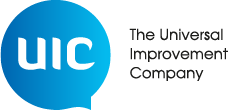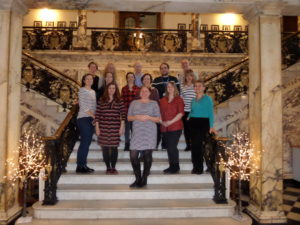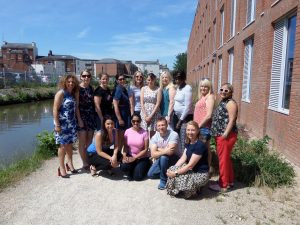Universal Improvement Skills
Universal Improvement Skills teaches participants about improvement for individuals, teams and organisations.
It provides an integrated set of skills, tools and techniques that are universally applicable and transferable to a wide range of activities in the workplace. These skills can transform the way people work both on their own and in groups.
Participants learn both hard and soft skills. Methodologies, tools and techniques sit alongside how to involve people and how to run meetings in a participative and productive fashion. To explain ‘why’ as well as ‘how’, a brief introduction of the history and theory underpinning the ideas is provided at each stage.
Continually refined and developed based on real-life experience, Universal Improvement Skills has been running since 1994. Participants find that the application of these powerful but straightforward tools, techniques and methodologies has a dramatic effect on their projects, meetings, planning, day-to-day work and in the way they work with groups of people.
Duration and who should attend
This course is 3 days in duration and any of these people will benefit from it:
- Senior, middle and junior managers
- Project Leaders
- People who lead teams in the workplace
- People who need to improve their project management skills
- People who delegate project work to others
- People who run and spend time in meetings
- People who would like to be more structured in how they work
- People who have lots of different things to juggle
- Bright sparks who would benefit from a developmental opportunity
What participants will learn
Organisational Improvement
- A brief history of improvement in organisations and Key Concepts that underpin the thinking and approach
- How to convert strategy and good intentions into real change in the workplace
Projects
- The UIMPROVE framework for setting up and running projects. This can be applied in all organisations and industries.
- Annual Project Planning
- How to identify all the projects that need to be carried out over the next 12 months
- How to prioritise the resulting list
- How to set up a Project Steering Grid to monitor and steer the projects
- Setting up individual projects
- How to write a clear and concise Project Remit
- How to take into account inclusions, exclusions and interdependencies
- Different roles in projects: Champion, Project Leader, Project Team Member, Key Player, Specialist
- Tools and techniques for involving people in projects
- How to run a Project Kick-Start: This is an initial event that involves a wide range of people to increase understanding, alignment and commitment from those involved, and get the project off to the best possible start
- A set of project methodologies that provide step-by-step guidance from the beginning to the end of any project: Planning, Improvement, Problem Solving, Major Project
- How to take an individual project and break it down into its component parts, identifying actions, timescales and milestones
Tools and techniques
- Tools for Planning and Organising
- Brainstorming, Clustering-by-Theme, Must-Should-Could, TPN Analysis, Chronological Clustering – participants learn how and when to use each of these
- Techniques for Productive Meetings
- Straightforward but highly effective structural techniques that will increase participation, variety, productivity and enjoyment of meetings
Processes and how to improve them
- The principles of process improvement
- How to use Improvement Methodology to improve a process
- Analytical tools – Ishikawa Diagrams and Deployment Flowcharting
Participants learn both hard and soft skills. Project methodologies, tools and techniques sit alongside how to involve people and how to handle project team meetings in an integrated fashion.
Style and structure of the course
Universal Improvement Skills follows a tried-and-tested approach that is highly participative and practical.
Our training does not involve sitting around staring at a screen. Instead people get to think about and apply what they are learning to their own real-life scenarios including projects and meetings. There is ample opportunity to pick the brains of the people running the course. A ratio of two UIC Consultants to a maximum of 12 participants ensures that everyone gets a chance to contribute to discussion and ask questions.
Participants receive our comprehensive manual, The Complete Guide to Improvement. This contains easy to follow, step-by-step guidelines including everything covered on the course and a lot more.
Support materials
Participants can also access support materials such as model agendas for Project Kick-Starts and project team meetings, and other templates such as Project Remits from our website.


